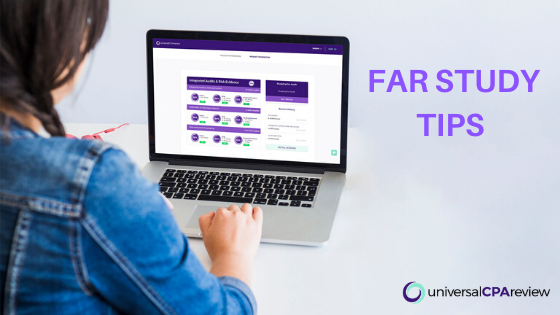The Financial Accounting and Reporting (FAR) portion of the CPA exam undoubtedly contains the most amount of content. You will be tested on generally accepted accounting principles, non-for-profit accounting, and governmental accounting. The majority of candidates probably rank FAR as the most difficult exam. In my opinion, it is not the most difficult due to the content per say, but has more to do with the number of concepts you need to be well versed in. However, the test is very passable if you are prepared and time yourself adequately. Below I will outline various tips to pass the exam.
 Practice Multiple Choice Questions Obsessively
Practice Multiple Choice Questions Obsessively
This is easily the best tip I have for passing the FAR portion of the CPA exam. Many of the multiple-choice questions can be answered due to recognition of key concepts. If you incessantly practice multiple-choice questions at every chance you get, I can almost guarantee that you will see multiple questions worded exactly the same, and many questions worded in slightly different ways. Just based on recognition and memorization of questions practiced during study time will give you essentially “free” points on the exam that you don’t have to spend time and brain power contemplating. Additionally, multiple-choice questions can prepare you for so many different concepts that will assist you in the task-based simulations as well.
Study All Content
My second tip is to study (and understand) all concepts that are included in your review course. Ignoring the hard sections is not going to magically exclude those concepts from your test. Additionally, the worst feeling in the world is opening your test to find it filled with concepts that you chose not to study. You should be fully prepared to answer at least 4-5 questions on every section of your review course.

Understand Journal Entries
FAR literally stands for “financial accounting and reporting”. As such, it should be no surprise that this portion of the exam is going to require you to understand and be able to perform journal entries. Again, I know many of us don’t enjoy journal entries, but ignoring them will only hurt you. They will be on the test, and there is a high chance you will encounter them through multiple-choice questions and task-based simulations.
Pace Yourself
Although this tip applies to all sections, it’s crucial for the FAR portion. This test will require some simple math and calculations. Because of this, it’s very easy to get caught up on questions that will easily eat up time. As you study, practice tracking the amount of time you spend on each multiple-choice question. When you are in the test, flag questions you don’t know and move on.
Give Yourself Enough Study Time
My last tip has everything to do with timing. This is not a test that you can cram for and be prepared in 3 weeks. This should be the section that you allow yourself the most study time. As I’ve said multiple times, it contains the most content and you need to know it all. Also, there will be concepts within the study materials that you may have never seen before and therefore need to devote more time to. Don’t rush yourself. Block of ample amount of time to give yourself the best chance of passing.

